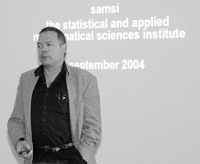SAMSI, at Three Years, Announces Program Themes through 2006
January 1, 2005

Participating in a panel discussion at the kickoff workshop for SAMSI's Latent Variable Models in the Social Sciences program (2004-05) were Michael Browne, Thomas Richardson, Karl J�reskog, and Kenneth Bollen.
The Statistical and Applied Mathematical Sciences Institute, in Research Triangle Park, North Carolina, has entered its third year of operation. SAMSI is a national institute in the mathematical sciences, funded by NSF, whose mission is to forge a new synthesis of the statistical sciences with the applied mathematical sciences and disciplinary science to confront the very hardest and most important data- and model-driven scientific challenges.
After a very successful second year, with well over 700 participants in SAMSI activities, the current year has an exciting slate of programs---on the computational biology of infectious diseases, latent (hidden) variable models in the social sciences, and data assimilation for geophysical systems. Some opportunities for participation in these programs still remain, especially the latter, which did not begin until January 2005. Readers can visit the SAMSI Web site (www.samsi.info/) for further information.
Plans are also well under way for SAMSI's 2005-06 programs, which offers numerous opportunities for participation by the SIAM community. New and senior researchers can visit SAMSI for periods of one month to one year, which allows new researchers to benefit from both the SAMSI environment and financial support and senior researchers to broaden their interests and skill sets.
Several postdoctoral positions will be funded for each SAMSI program. In addition, special research programs will be available for graduate and upper-level undergraduate students so that they can begin their involvement in cross-disciplinary and team research.
Each SAMSI program will also have at least an opening and a closing workshop, which will allow individuals who cannot spend part of the year at SAMSI to participate in these research efforts.
New researchers and members of underrepresented groups are especially encouraged to participate in all SAMSI programs.
SAMSI encourages readers to propose topics for future research programs. Suggestions can be directed to SAMSI's director, James Berger ([email protected]); other members of the SAMSI directorate: Tom Banks ([email protected]), Alan Karr ([email protected]), and Young Truong ([email protected]); or the SAMSI National Advisory Committee, chaired by Peter Bickel and Margaret Wright.
SAMSI programs for 2005-06 are:
- Financial mathematics, statistics, and econometrics, September 2005 through December 2005. This program will be led by Jean-Pierre Fouque and Eric Ghysels. The goal is to bring together mathematicians, statisticians, and econometricians to focus on the major challenges in the three essential tasks of modeling, data analysis, and computation---in applications ranging from financial and energy derivatives to real options and defaultable securities.
- National defense and homeland security, September 2005 through May 2006. To be led by Lawrence Cox and Nell Sedransk, this program will emphasize (a) biointelligence, which intersects the planned development of a CDC biointelligence center; (b) real-time inference, involving data streams; (c) anomaly detection, with particular attention to high-dimensional data, extremely rare events, and false-positives; (d) data integration, including integration of new forms of data, such as images or biometric identification; and (e) the dynamics of massive databases, which is in part a fundamental issue of data quality.
- Astrostatistics, January to June 2006. This program, to be led by Jogesh Babu, will address a range of statistical and mathematical problems that arise in modern astronomical and space sciences research, mainly as a consequence of the flood of data produced by space-based astronomical surveys at many wavebands. Collaborations involving astronomers, mathematicians, and statisticians on novel problems facing upcoming astronomy missions will be a special emphasis of the program.
In addition to these three major programs, SAMSI will conduct planning or hot-topics workshops, undergraduate and graduate outreach workshops, summer schools (as part of programs), and several interdisciplinary courses associated with ongoing programs.

Organizing committee member Tom Kepler of Duke University at the opening workshop for the 2004-05 SAMSI program on the computational biology of infectious disease.
For more information about any of these SAMSI activities and opportunities for participation, readers should visit the SAMSI Web site at www.samsi.info/.

